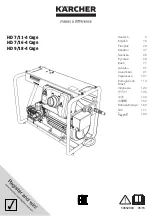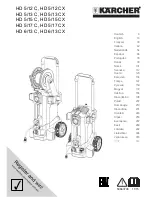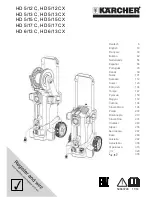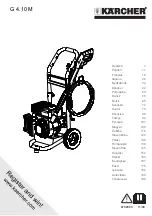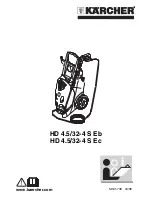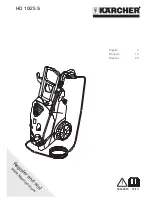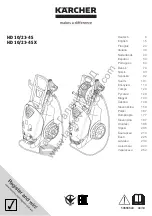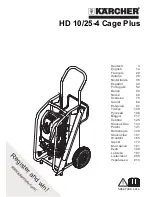
13
OPERATION
APPLICATIONS
You may use this tool for the purposes listed below:
Removing dirt and mold from decks, cement patios, and
house siding
Cleaning cars, boats, motorcycles, outdoor furniture, and
grills
STARTING AND STOPPING THE PRESSURE
WASHER
See Figures 11 - 13.
CAUTION:
Do not run the pump without the water supply con-
nected and turned on. This will damage the high
pressure seals and decrease pump life.
Before starting the engine, connect all hoses and check all
fluids (oil and gas). Turn the garden hose on then squeeze
the trigger. This relieves air pressure caused by turning on the
water. Hold the trigger until a steady stream of water appears.
To start an engine that is cold or has run dry:
Close the fuel valve.
Fill the fuel tank (if necessary).
Connect the garden hose to the pump and turn on the
water supply.
Open the fuel valve.
Place the engine switch in the
ON ( l )
position.
Push the choke lever to position
A
(CLOSED).
NOTE:
If the engine is cold, close the choke fully. If the
engine is warm, open the choke lever half-way or keep it
opened fully.
Give the recoil starter short, brisk pulls to start the
engine.
If the engine fires, or begins to sputter and/or cough
without catching, move the choke lever to the half-way
position.
NOTE:
Never pull the recoil starter more than four or five
times with the choke closed as this causes flooding.
With the choke in the half-way position, pull the recoil
starter again. The engine should now start.
NOTE:
If the choke remains in the closed position, the
engine will continue to sputter and/or cough but will not
start.
Return the recoil starter gently to the engine housing. Do
not allow the rope to snap back.
As the engine warms up, move the choke lever slowly to
position
B
(OPENED).
Let the engine warm up a few minutes before using.
To stop the engine using the engine switch:
Turn the engine switch to
OFF ( O )
position.
Close the fuel valve.
Fig. 1
Fig. 11
RECOIL
STARTER
ENGINE
SwITCH
CHOKE
(CLOSED - A)
fuEL vALvE
ON
CHOKE
(OPENED - B)
Off
Fig. 13



























